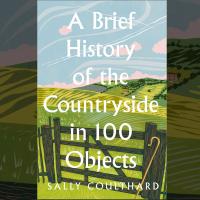Sally Coulthard’s A Brief History of the Countryside in 100 Objects is just that. It’s not a detailed, nor definitive, history of the natural landscape; rather it is, as Coulthard herself says, ‘a history of the countryside, told through the filter of someone fascinated by the courage, charm and occasional callousness of my rural ancestors’. Within its pages is a wonderful collection of snippets of information and surprising facts woven into a narrative that spans over twelve thousand years, all tied together by Coulthard’s easy, flowing style, heightened to perfection with her trademark gentle humour and wordplay.
Within its pages is a wonderful collection of snippets of information and surprising facts woven into a narrative that spans over twelve thousand years, all tied together by Coulthard’s easy, flowing style, heightened to perfection with her trademark gentle humour and wordplay.
The way the history is told is not just fashionable, but clever. Material history – using objects as the starting point to describe a history of, for example, a place, a trade, or an idea – is perfectly suited not just to Coulthard’s style, but also to the subject. Historians have occasionally tried the longue durée approach, with varying degrees of success. But by its very nature, this sort of history becomes impersonal, scientific, distant. Instead, here we have a subject that could fill volumes and still not be complete, wrapped up in a neat parcel of just over 300 pages that still manages to convey all the main themes: change, continuity, progress, damage and adaptability. Each short chapter alights on one particular object, beautifully illustrated, that represents a certain point or change – a headdress, a dried cat, a potato rake, even a road sign – and through that blossoms into a story that is both interesting and significant.
As is often the case with Coulthard’s writing, there is a deeper point to be made. Beneath the canopy of fascinating titbits – the nineteenth-century hatred of sparrows, or the improbability of growing trees that produce tasty apples from an apple seed, for example – there is the shaded understorey that tells a more worrying tale. The countryside has come under some significant attacks recently. Aside from the massive and costly construction projects that blot the landscape, destroy natural habitats, and wreck communities, or the literal streams of waste that befoul our waterways, choking the life out of them in the process, there have also been complaints that its people are backward, insular, and hold dearly to any number of ‘-isms’. Sally Coulthard’s book is the corrective. It is a magnificent defence of what even now represents a significant majority – albeit a shrinking one – of the British landscape. Rejoicing in its quirks, revelling in its occupants – be they human, animal, or vegetable – while never wearing the rose-tinted spectacles that give the lie to the more absurd panegyrics, it paints the countryside in all its muddied glory. But more than that, it is a call to arms: to look after the landscape, its occupants – in whatever form – and its institutions. In reminding readers about the past and present of the countryside, Coulthard invites them also to look forward, to wonder what the future – if there is one – might be.
In a world that seems to be getting more dangerous by the day, there is a selfish reason, too, for looking after our countryside: when all else fails, how can we perform the simple task of feeding ourselves. How can we get everything we need from land exhausted by the intensive farming of a few, limited crops? How can we find the skills necessary even to make the most of our own personal, ever-decreasing plots of land? The countryside is not just the space between towns and cities. It is its own living, breathing, varied, difficult yet beautiful entity. Sally Coulthard knows this, as do many of the people who make rural Britain their home – as well as those who are naturally drawn to A Brief History of the Countryside. The depressing problem is that she might be preaching to the choir. However, if even just a few others pick it up, they can’t fail to witness, to understand for themselves, the importance and majesty of the natural landscape and all that fill it. Coulthard’s mission is a challenging one. But if anyone can do it, she can.


